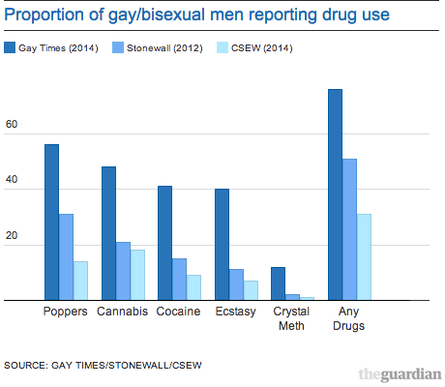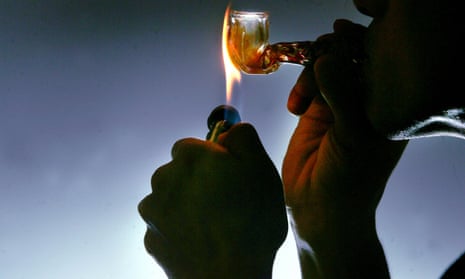Hold the front page. BBC Newsbeat, the Huffington Post, PinkNews and others have reported this morning that sex among gay men has been ‘linked to drink and drugs’.
The story is based on a survey into drug use carried out by Gay Times magazine last month. They surveyed 1,000 of their readers online about their use of alcohol and drugs as well as their sexual behaviour.
The bone-shattering dog-bites-man banality of the top line – people have sex when drunk – notwithstanding, the story includes some alarming figures about gay men’s consumption of drugs and alcohol, and their link to unsafe sexual behaviour.
One of the questions asked respondents what drugs they used before sex, and the results suggest that gay and bisexual men are much more likely to consume drugs than the general population. According to the survey, 56% had used poppers/amyl nitrites, 48% had used cannabis, 41% had used cocaine and 40% had used MDMA/ecstasy.
More concerningly, it found that one in nine respondents said they had used mephedrone, ketamine or crystal meth. Mephedrone and meth are currently at the centre of concerns among public health practitioners about gay men’s use of drugs in a sexual context.
The survey’s conclusion is clear: gay and bisexual men are incorrigible, unrepentant alcoholic, drug-snorting sex dreadnoughts, who wouldn’t be seen dead getting it on without a line of something typically found in a rock star’s dressing room.
The reality might, thankfully, be less exciting
The survey has a fundamental problem, which is that, unlike most professionally-conducted surveys and research, its participants were self-selecting. It was hosted online, advertised to Gay Times readers online, and pitched specifically as a ‘drugs survey’. This can have a big effect on who answers the survey, both in terms of who hears about it, and who feels that it’s relevant to them and so worth taking the time to respond to.
By way of illustration, a 20-something party animal living in London who uses Twitter, frequents the Vauxhall scene and is comfortable using recreational drugs is both more likely to hear about and more likely to answer the survey than a middle-aged gay man living in the countryside with a dodgy internet connection.
This may sound quite minor, but we can start to see how this may have a large effect on the results when we compare it to previous research efforts. Similar data can be found not only in a 2012 survey carried out by Stonewall (which had a much larger sample of nearly 7,000), but also in recently published figures from the authoritative Crime Survey for England and Wales (CSEW). Both sets of figures suggest GT has considerably overestimated drug use.
Let’s take poppers (amyl nitrite if we’re being formal) as an example. Where the GT survey finds that 56% reported using them, Stonewall found just 31%. And the CSEW found just 14% of gay men reported using them, suggesting that GT’s figure is overinflated by a factor of three.
How about crystal meth, one of the more dangerous recreational drugs? Where GT found 12% of gay/bi men reporting use, the CSEW found just 1%.
And while the GT survey found that 76% of respondents had used any drugs recreationally, the CSEW found that 31% - less than half that figure - of gay or bisexual men had done so within the last year.
Coverage of the GT survey doesn’t make clear whether or not their drug consumption figures were limited to men who regularly took drugs before sex, or whether or not it was limited to men who took drugs within the last year as opposed to “ever”. However, the phrasing of the coverage suggests that it generally refers to current practice, and the original questions and methodology are not public at the time of writing
Take a look at the figures below for poppers, cannabis, cocaine, MDMA and crystal meth. In all instances, the Gay Times reports a far higher level of use than the CSEW.

While Stonewall and the CSEW indicate that gay and bisexual men are more likely to consume drugs and alcohol than the general population, the GT survey appears to have wildly overestimated their hedonistic tendencies.
Similar problems abound with the GT survey’s take on risky behaviour while under the influence of drugs and alcohol. 73% report that they have had sex with a stranger while under the influence of alcohol, and 94% say that they have had sex while drunk.
This sort of thing doesn’t tend to get collected by official statistics bodies, so its difficult to find a comparator for the UK as a whole. However, previous research would suggest that the link between alcohol consumption and sexual disinhibition is certainly not unique to gay men.
Concerns about gay men’s drug use are real and legitimate, and there are clinics in London that are very worried about some of the behavioural patterns they are seeing. Research into chemsex has some very alarming things to say about gay men using drugs to mask issues around self-confidence and self-esteem.
The Gay Times’ editor Darren Scott has said: “The GT drug survey came about because we were bemused at the amount of news stories in the mainstream media about gay and bisexual men and drugs. It seemed, to me at least, that this had become an accepted misconception of gay lifestyle with little fact to back it up.”
With headlines like “‘Most’ gay men have tried drugs” , “Would you have bareback sex under the influence of drink or drugs? This survey says you might” and “Gay sex ‘linked to drink and drugs’” , it appears that rather than combat this misconception, the GT survey has instead served only to encourage it.
Update: This piece was modified on August 1. It previously referred to amyl nitrite as amyl nitrate.

Comments (…)
Sign in or create your Guardian account to join the discussion